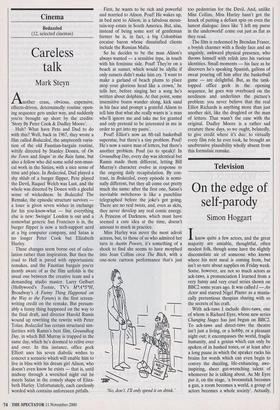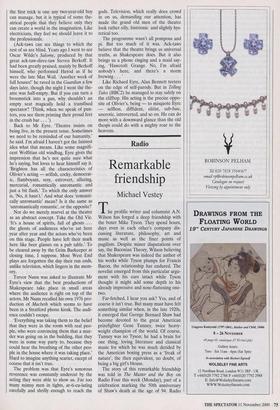Television
On the edge of self-parody
Simon Hoggart
I know quite a few actors, and the great majority are amiable, thoughtful, often modest folk, though some have the slightly disconsolate air of someone who knows where his next meal is coming from, but isn't so sure about supplies on Friday week. Some, however, are not so much actors as ack-taws, a pronunciation I learned from a very funny and very cruel series shown on BBC2 some years ago. It was called I —An Actor and starred Nigel Planer as a mania- cally pretentious thespian sharing with us the secrets of his craft.
With ack-taws I include diree-taws, one of whom is Richard Eyre, whose new series Changing Stages has just begun on BBC2. To ack-taws and direct-taws the theatre isn't just a living, or a hobby, or a pleasant night out; it encompasses the world, fragile humanity, and a genius which can only be spoken of in hushed tones, or at least after a long pause in which the speaker racks his brains for words which can even begin to convey the dazzling, life-enhancing, awe- inspiring, sheer gut-wrenching talent of whomever he is talking about. As Mr Eyre put it, on the stage, 'a broomstick becomes a gun, a room becomes a world, a group of actors becomes a whole society'. Actually, the first trick is one any two-year-old boy can manage, but it is typical of some the- atrical people that they believe only they can create a world in the imagination. Like electricians, they feel we should leave it to the professionals.
(Ack-taws can see things to which the rest of us are blind. Years ago I went to see Oscar Wilde's Salome, produced by that great ack-taw-direc-taw Steven Berkoff. It had been greatly praised, mainly by Berkoff himself, who performed Herod as if he were the late Max Wall. 'Another week of full houses!' he raved in the Guardian a few days later, though the night I went the the- atre was half-empty. But if you can turn a broomstick into a gun, why shouldn't an empty seat magically hold a transfixed spectator? 'Think, when we speak of pun- ters, you see them printing their proud feet in the crush bar . . . ') Back to Mr Eyre. 'Theatre insists on being live, in the present tense. Sometimes we need to be reminded of our humanity,' he said. I'm afraid I haven't got the faintest idea what that means. Like some magnifi- cent Wolfitian old windbag, Eyre gives the impression that he's not quite sure what he's saying, but loves to hear himself say it. `Brighton has all the characteristics of Olivier's acting — selfish, cocky, democrat- ic, flamboyant, sexy, extrovert, alluring, mercurial, romantically unromantic and just a bit flash.' To which the only answer is, 'No, it hasn't.' And what does 'romanti- cally unromantic' mean? Is it the same as `unromantically romantic', or the opposite?
Nor do we merely marvel at the theatre as an abstract concept. Take the Old Vic. `It's a house of spirits, full of ghosts . . . the ghosts of audiences who've sat here year after year and the actors who've been on this stage. People have left their mark here like beer glasses on a pub table.' To be cleared away by the Grim Barkeeper at closing time, I suppose. Most West End plays are forgotten the day their run ends, unlike television, which lingers in the mem- ory.
Trevor Nunn was asked to illustrate Mr Eyre's view that the best productions of Shakespeare take place in small areas where the audience is right on top of the actors. Mr Nunn recalled his own 1976 pro- duction of Macbeth which seems to have been in a Stratford phone kiosk. The audi- ence couldn't escape.
`Everything was taking them to the belief that they were in the room with real peo- ple, who were convincing them that a mur- der was going on in the building, that they were in some way party to, because they could hear the breathing of the other peo- ple in the house where it was taking place.' Hard to imagine anything scarier, except of course that it isn't true.
The problem was that Eyre's sonorous reverence was constantly undercut by the acting they were able to show us. Far too many mimsy men in tights, ar-ti-cu-lating carefully and shrilly enough to reach the gods. Television, which really does crowd in on us, demanding our attention, has made the grand old men of the theatre look rather silly, histrionic and slightly hys- terical too.
The programme wasn't all pompous and pi. But too much of it was. Ack-taws believe that the theatre brings us universal truths, as Shakespeare does. But it also brings us a phone ringing and a maid say- ing, 'Hawcroft Grange. No, I'm afraid nobody's here, and there's a storm brewing . .
Like Richard Eyre, Alan Bennett teeters on the edge of self-parody. But in Telling Tales (BBC2) he managed to stay safely on the clifftop. His acting is the precise oppo- site of Olivier's, being — to misquote Eyre — selfless, diffident, elitist, sub-fuse, unerotic, introverted, and so on. He can do more with a downward glance than the old thespS could do with a mighty roar to the heavens.



























































































 Previous page
Previous page